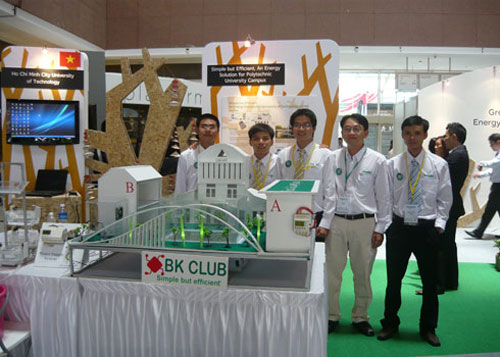Energy saving solutions for universities
Using turn-off sensors, electric switches integrated into locks and rainwater tanks, 3 students from Ho Chi Minh City Polytechnic University have successfully researched the power saving project for the school.
Using the actual calculation data, the project of 3 students Bui Thai Luan, Tran Ngoc Quy and Le Truong Phu aims to find a solution to use electricity and water at Ho Chi Minh City University of Technology in a suitable way. reason, avoid waste, save energy costs.

Group of Polytechnic students at the competition in Singapore, where they won the second prize for energy saving project at Ho Chi Minh City Polytechnic University.Photo: Huy Duc
To save electricity, the group focused on lighting and air conditioning systems, which are the two main areas of electricity use. The group proposed replacing new energy-saving lamps, installing sensors in classrooms to count the number of students going to school to open the priority lights near the lectern . The corridor lights are managed according to the real-time system, turned on at 6pm and turned off at 6am, avoiding opening all day causing waste.
For air conditioning, the electrical switch is integrated into the door lock to prevent the air conditioner from opening when there is no one in the room .
The water saving solution of the group is to build rainwater tanks to utilize rainwater for use in toilets and watering plants. These are places that do not require high quality water.
Thai Luan, a member of the group, said that in order to get accurate data from the practice, the group had to borrow the school's utility bill for research. The most difficult step in the process of implementing the project is to conduct measurements at the buildings in Ho Chi Minh City Polytechnic University to apply a reasonable solution.
' The solutions given are just the means to support energy saving and the important factor of Japan is still the consciousness of human use , ' said Nguyen Tuan Hung, the instructor of the group. Therefore, the group also introduced energy usage data in each place so that people could know and be conscious of saving.
Mr. Hung said that this project can save up to 50% of the energy used ; only within 8 months will recover capital.
This assessment is a highly practical project that can be applied to many places such as schools, hospitals and offices; The organizers of the Energy Savings Contest for students of Southeast Asian countries taking place in Singapore last March awarded the second prize to this group of 3 students at Ho Chi Minh City University of Technology .
- Build the first energy-efficient home in 2013
- Energy efficient use saves 21 million US dollars per year
- Do not use gas-saving tablets
- Cleanweb - an energy efficient solution
- Energy saving market in Vietnam is prospering
- Energy saving exam in the building
- The brain also has an energy saving mode
- New generation super energy vehicles
- Signing to promote energy saving activities
- VN-Venezuela produces electricity-saving light bulbs
- 'Environment-friendly' solutions for your home
- Europe is about to death the incandescent light bulb
 Daily use inventions come from universities
Daily use inventions come from universities Special weight loss device helps prevent appetite
Special weight loss device helps prevent appetite 8 inventors were killed by their own inventions
8 inventors were killed by their own inventions Iran invented a motor car powered by water
Iran invented a motor car powered by water